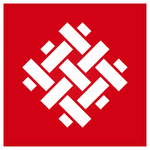US 6th Army Group
| Sixth United States Army Group | |
|---|---|

Sixth Army Group Shoulder Sleeve Insignia
|
|
| Active | 1944–45 |
| Country |
|
| Branch |
|
| Type | Army group |
| Role | Army Group Headquarters |
| Size |
200,000: Seventh U.S. and First French Armies |
| Part of | Allied Expeditionary Force |
| Engagements | World War II |
| Commanders | |
| Notable commanders |
Jacob L. Devers |
200,000:
The Sixth United States Army Group was an Allied Army Group that fought in the European Theater of Operations during World War II. Made up of field armies from both the United States Army and the French Army, it fought in France, Germany, Austria, and, briefly, Italy. Also referred to as the Southern Group of Armies, it was established in July 1944 and commanded throughout its duration by General Jacob L. Devers.
In a lead role in Operation Undertone, its Seventh Army fought its way across the Rhine into Germany, captured Nuremberg and then Munich. Finally it crossed the Brenner Pass and made contact with the US Fifth Army at Vipiteno, Italy.
The Sixth Army Group was originally created in Corsica, France (specifically activated on 29 July 1944) as "Advanced Allied Force HQ", a special headquarters within AFHQ (the headquarters of Henry Maitland Wilson, the Supreme Commander Mediterranean Theatre) commanded by Lieutenant General Jacob L. Devers. Its initial role was to supervise the planning of the combined French and American forces which invaded southern France in Operation Dragoon and provide liaison between these forces and AFHQ. Dragoon was the operational responsibility of the Seventh United States Army commanded by Lt. Gen. Alexander Patch. Available to Patch were three corps (US VI Corps and French I and II Corps) and 24,000 Maquis of the Forces Francaises de l'Interieur. The two French corps constituted French Army B commanded by Général Jean de Lattre de Tassigny which was later renamed French First Army. Although Sixth Army Group Headquarters was officially activated on 1 August, it consisted of only the personnel of the Advanced Detachment AFHQ and, for reasons of security, retained the detachment title. The Advanced Detachment headquarters on Corsica had no command or operational duties and functioned primarily as a liaison and coordinating agency while preparing itself for the day it would become operational in France as Sixth Army Group headquarters.
...
Wikipedia
